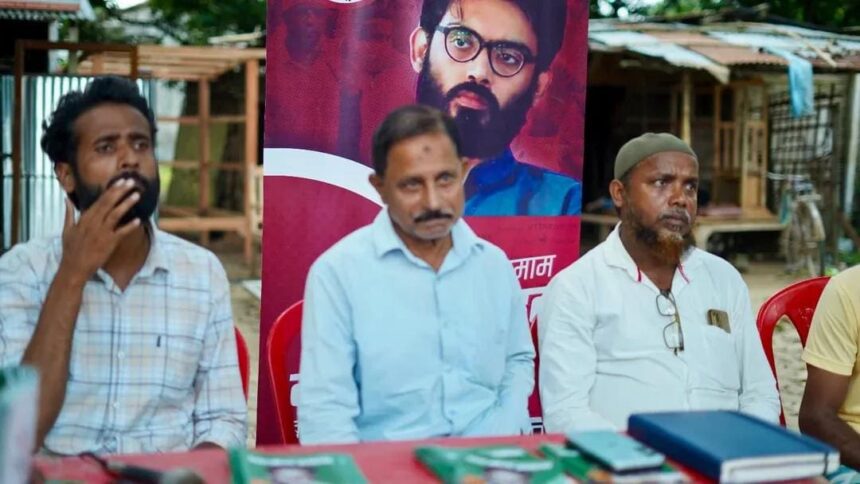Sharjeel Imam, a research scholar and former student of Jawaharlal Nehru University (JNU), will not contest the upcoming Bihar Assembly elections in 2025, citing legal constraints, lack of campaign freedom, and limited communication with voters due to his incarceration. He said he will, however, continue to focus on structural reforms and minority rights in India.
Imam has been in jail since 2020 under charges related to alleged sedition and conspiracy during the anti-CAA protests.
Despite withdrawing from the election, Imam said his team would continue its political work and use this time to deepen community engagement and strengthen grassroots networks.
“We needed more time… our struggle for systemic change will continue beyond elections,” he said in a public statement released earlier today.
The announcement has left many of his campaign team members and family in Bahadurganj, where Imam was expected to contest, disappointed but resolute.
Volunteers who had been mobilising support for months said the decision was “painful but understandable.”
Muzammil Imam, Imam’s brother, said, “Our goal was not to get a seat in the Vidhan Sabha; our goal was to ignite Sharjeel’s ideas among the masses and make them think critically. Contesting elections was the start of that structural change that Sharjeel envisioned.”
“We will continue to challenge that rigid structure through his ideas, thoughts, and words if not through elections for now. Once he is out, he will do it better than all of us,” he added.
Regarding the court’s restrictions, Muzammil said, “The court is putting restrictions, but more than that, accessibility of the process to contest an election is an issue for a normal citizen like Sharjeel.”
He said, “The entire process of just getting the nomination done is so regressive that it is nearly impossible to get it done while he is in jail.”
Afreen Fatima, Fraternity Movement leader and former JNUSU leader, who was part of Imam’s campaign team, said, “Sharjeel bhai always wanted to be a part of a democratic process in a democratic way, but the way courts are restricting him despite being the most competent person with a nuanced understanding of politics, is very unfortunate and unacceptable.”
“He has always believed in practicality rather than theory, and that’s what he wanted to do if he joined politics or while he was contesting elections. He wanted to campaign not just by releasing statements but by being among the people he was contesting for. He wanted to communicate with people, but the state won’t act democratically and will do everything in its power to not let him exercise his rights within the democracy,” said Fatima.
She added, “If you read his letters and statements, which he wrote from prison, you will understand how much will and courage he has to represent his people. And not just him — we all were looking beyond the mere representation of Muslims, as has been the case for years.”
Fatima, reiterating Imam’s words, said, “We are disappointed with the system, but we are not discouraged. We are only withdrawing from this election, but our work for the community will continue in its entirety. We are looking forward to a long-term political shift in terms of representation, and Sharjeel bhai will always be the leader spearheading these changes.”
“Sharjeel bhai envisions a society that not only represents our community but also talks about equal rights, which is beyond tokenism, and we will carry forward that vision. This is just a step towards the end goal that is his vision,” she added.
A local from Bahadurganj, coordinating Imam’s campaign in the region, said, “We were preparing day and night. People were excited, especially young voters, to have someone who talks about rights and equal representation. The state has made it nearly impossible for him to campaign.”
He said, “His message has already reached the people. His campaign wasn’t just about winning a seat; it was about showing that marginalised voices can challenge those in power and stand for justice. We will continue spreading that message.”
Lubaib Basheer, National General Secretary of the Fraternity Movement, also viewed the denial of bail and restrictions from the courts as criminalising dissent.
Basheer told Maktoob, “His decision to contest was not an act of conventional politics but a continuation of his consistent struggle to articulate the structural demands of the marginalised — demands for decentralisation, proportional representation, and justice for minorities at various levels.”
He said, “The denial of bail and the consequent inability to contest freely expose how the state continues to criminalise dissenting Muslim voices.”
Basheer believes that the ideas represented by Sharjeel have already spread far beyond Bahadurganj and said, “His ideas have transformed into a collective aspiration for justice and equality.”
“His withdrawal from the elections is not being seen as a setback, but as a reminder of the political fear evoked by his message among those who seek to preserve the status quo,” he added.
The post “Not a setback, but a resolve that continues”: Sharjeel Imam, friends stand firm after Bihar poll withdrawal appeared first on Maktoob media.










